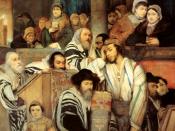Judaism may be defined as 'the culture of a people, a people for whom the idea of statehood is important, and who in the past have existed as a nation in their land, or have enjoyed a large measure of communal autonomy in foreign lands' (Alexander, 1984, p. 11). Rabbinical Judaism is the form of Judaism as we know it today. Within this form of Judaism we have a central role, a Rabbi. The Rabbi is the personification of the Torah and the authority the Rabbi has, comes from the close union that they have with the Torah. As the living role of the Torah, the Rabbi is a role model for all Jewish people to aspire to. Before we look into the Rabbinical World of Judaism, we must first look back and understand a brief history of Judaism in itself.
"Now the LORD said unto Abram: "Get thee out of thy country, and from thy kindred, and from thy fathers house unto the land that I will show thee.
I will make of thee a great nation, and I will bless thee and make thy name great; and be thou a blessing." (Genesis 12:1-2). 'God chose Abraham to be the father of a people who would be special to God, and who would be an example of good behaviour and holiness to the rest of the world. God guided the Jewish people through many troubles, and at a time of Moses he gave them a set of rules by which they should live, including the Ten Commandments' (Religion and Ethics: Judaism, n.d.).
Judaism had now risen and been born. The Jew's, with God's leadership and direction, produced many great people such as King Solomon who built the first Temple and started the Temple worship. After 920 BCE when the...


